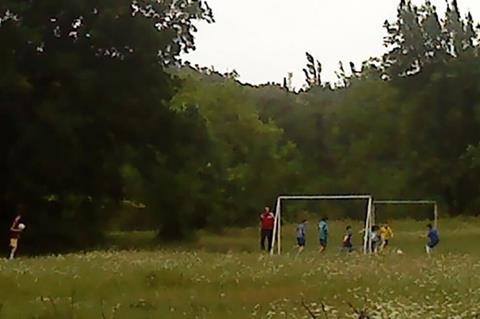The latest from Alexandre Koberidze follows a father looking for his missing daughter in rural Georgia and premiered at Locarno

Dir-scr: Alexandre Koberidze. Germany, Georgia. 2025. 186 mins.
Lisa, a sports photographer, vanishes, leaving just a letter for her parents. Her worried father Irakli (David Koberidze, the father of director Alexandre Koberidze) sets off on a cross-country road trip, retracing the route of Lisa’s most recent photo project, shooting the village football pitches of rural Georgia. The leisurely latest from Koberidze (What Do We See When We Look At The Sky?) combines many of the director’s preferred storytelling elements: football, dogs, matter-of-fact magical realism, a laconic narration and a lush orchestral score all figure prominently. But the aspect that makes the picture most distinctive is also the one that may limit the film to festival curio status rather than following the arthouse theatrical trajectory of its predecessor: it was shot entirely on a long-discontinued and defiantly low-res camera of a Sony Ericsson phone from the early 2000s.
Koberidze invites us to reshape and reappraise our perspective on what constitutes beauty
In tech terms, it might as well have been carved onto a stone tablet. The look of the picture is so pixelated and corrupted that, at first, we instinctively suspect that it’s a mistake rather than a deliberate aesthetic choice. There’s an assumption that if a director is going to offer up a three hour-plus film in which not very much at all happens, it will at least look conventionally beautiful. But Koberidze invites us to reshape and reappraise our perspective on what constitutes beauty. It’s a bold decision and, coupled with the endurance-testing pacing and running time, one which will make the film something of a marketing challenge beyond the die-hard Koberidze fan base. And yet there is something alluring here – it’s a meditative and elusive picture that conveys a spiritual beauty as much as an aesthetic one. The film screened in London following its premiere in Locarno (where it picked up a Jury special mention and the Fipresci prize). It recently won the Grand Prix at the newly relaunched Bangkok International Film Festival, and has a healthy festival run scheduled, including screenings in Chicago, Gent, Vienna and Sao Paulo film festivals.
Irakli shares with his daughter (and, one suspects, the film’s director) a passion for sports. But he takes time off from his job as a gymnastics coach to scour the country for traces of Lisa. He’s accompanied in this quest by Levan, Lisa’s colleague at the sports magazine that she works for. And here’s where the magical realist element comes in: Levan, who is voiced by Otar Nijaradze, is invisible. It’s a condition that he shares with a sizeable proportion of the supporting cast, but, aside from a mention in the narration at the start of the picture, Levan’s transparency and that of the other characters is dismissed as a non-issue. Irakli, meanwhile, is a gruff man who appears to be in his sixties. He’s a granite-face softy, a kindly figure who feeds raspberries to calves and takes time out to say goodbye to his favourite street dog, Panda, before he embarks on his trip.
It’s a trip which, it soon becomes clear, is destined to be fruitless. Irakli and Levan drive along precipitous single-track roads in search of the football pitches that Lisa had planned to photograph. At one spot, Irakli is recruited to help mend a goalpost which had been knocked over by a buffalo. At another, they find and share some freshly picked apricots. They chat to teenagers about the late snow which destroyed the grape harvest and killed off the vineyards – banal encounters but also meetings suffused in warmth.
The spectacular landscape of Georgia’s mountain country is reduced to blocky, fidgeting pixels – sometimes it’s not clear whether the dark smudge on the impressionistic, Monet-like blur of colours is a human or one of the many dogs, cats, cows or donkeys that Irakli befriends on his road trip. What makes it feel somehow profound is the use of music. Like What Do We See When We Look At The Sky?, the film is scored by Koberidze’s brother, the award-winning composer and professor of music Giorgi Koberidze. The compositions, which combine electronic elements with classical and traditional Georgian folk, are transcendently lovely. The rippling, quizzical woodwind motifs hang in the air like a question mark, suggesting that some mysteries don’t need to be solved – and Alexandre Koberidze’s meandering meditative oddity is one of them.
Production company: New Matter Films
International sales: Heretic info@heretic.gr
Producers: Mariam Shatberashvili, Luise Hauschild, Alexandre Koberidze
Cinematography: Alexandre Koberidze
Editing: Alexandre Koberidze
Music: Giorgi Koberidze
Main cast: David Koberidze, Otar Nijaradze, Irina Chelidze, Giorgi Bochorishvili, Vakhtang Panchulidze, Manu Tavadze















![[L-R]: Amanda Villavieja, Laia Casanovas, Yasmina Praderas](https://d1nslcd7m2225b.cloudfront.net/Pictures/274x183/6/4/1/1471641_pxl_20251224_103354743_618426_crop.jpg)









No comments yet